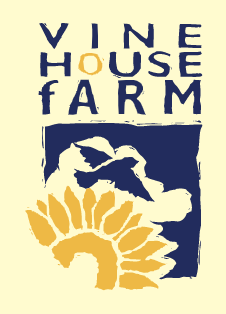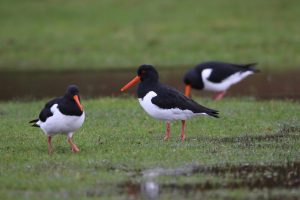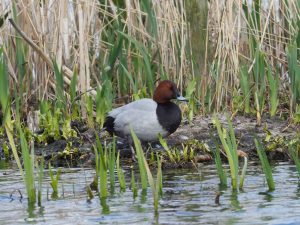
A fabulous February, a miserable March and April, and now a moderate May. I thought I would just remind you what a fabulous February we enjoyed. March was a dry month here, only 21mm of rain against an average of 44mm. It has been slightly warmer at 12.2°C, against the average of 11.9°C.

What a difference in weather there can be between two Springs; last year there wasn’t enough moisture for millet to grow and this year it was too wet when we would’ve liked to have drilled it. It was, however, safely drilled within a week of the optimum drilling date, and all is now poking through the ground.
We have been busy protecting the emerging sunflowers from pigeons; we have three fields this year, two with trees next to them and one with no trees near it. Peculiarly, the pigeons decided to attack the field with no trees and as we’ve failed to protect it sufficiently, it will have to be re-drilled. Once pigeons find the sunflowers , it is very difficult to keep them off – although this year, it has mostly been stock doves that have been causing us trouble.
We were a bit late getting the potatoes planted this year because of the wet April, but they are now growing. This time last year as the soil was so dry, we had to irrigate to start them growing.
All of last year’s potato crop, which was destined for the supermarkets, has been sold and delivered, but the potatoes that we have grown for MacDonald’s – all 1,000 tonnes of them – are still in the cold store and they will be loaded for delivery in the first two weeks of June or July.
The price of potatoes over the past few weeks has increased to the grower, but will probably not alter the price in the supermarkets. This is because the potato packers have been contracted to supply potatoes at a set price, regardless of the cost they have to buy them at.
This year – the first time for several years – all the old potatoes will be used up in July. Many of you will not have noticed that old potatoes were being sold in the shops last August and September, that is because we are able to keep them so well; it is a job to tell which are new and which are old. 50 years ago, every May we would be looking forward to new potatoes because the old potatoes were looking and tasting old.
Technology has moved on and that is just one of the thousands of improvements that has been made to the food that we eat. Some improvements have been done by using chemicals. I know we don’t want to be eating food that has been improved by using chemicals, but the same people who make those chemicals are making the pills for us to swallow that our doctors prescribe to us.


As I write this, it is as if winter has returned to us here in Lincolnshire as we have a cold NE wind blowing with no sunshine.
These are the days when live mealworms are needed in your garden. I haven’t seen a butterfly for the last three days, so I expect other insects have also gone into hiding. It is a time when the adult birds need to find more insects for both themselves and their young, as food is their heating when oil or gas is our heating.
All our fat products are very moist, and adults will be using them to take moisture to their nestlings. Cheap suet fat balls don’t offer so much moisture.
When large quantities of Super Suet fat balls or suet blocks are consumed from hanging feeders in the Vine House Farm garden, none of the birds seem to want to eat the mess that is left underneath. To combat this, I have been feeding suet blocks and suet pellets in a porcelain dish with vertical sides on the ground, covered with a ground cage and there is no mess.
If you don’t like feeding on the ground, why not put the dish on a bird table? If the Jackdaws and pigeons take over, stretch a couple of pieces of string around the bird table to stop those bigger birds getting at the suet. After all, if you provide a free café you will get people coming in that you don’t want. You then have to work out a way of keeping those people out.
These last two years there has been an invasion of brown tail moth caterpillars on some of our hedges and last year they ate all the leaves on one hedge. Later in the summer, the hedge grew another crop of leaves, but there were no berries on the hedge for the winter thrushes. So, this year I cut some of the webs off the hedge and let them fall to the ground. When it came to April however, the caterpillars emerged out of the webs I had missed and started eating the leaves, so at the time I wished I had cut off more webs.
The site is at one of our double hedges and every time I went there, I would see lots of birds crossing from one side to the other. When I was showing people round the farm, we could see all the caterpillars, but gradually there were less caterpillars and then the penny dropped – the birds were going across to feed on these hairy caterpillars. The hedge is now recovering as there are very few of them left. These caterpillars are also the food of the Cuckoo, so I have been able to see and hear a Cuckoo every day during May this year.
The Turtle Dove is one of the fastest declining birds in England. The RSPB is looking to improve conditions for it and there is also an organisation called the Turtle Dove Trust, of which I am chairman. The Trust is rearing about 500 birds annually to be released into suitable habitat in East Anglia, our farm included. Young Turtle Doves are not very site faithful but some of those released last year have returned to their release site. If anyone would like to donate and or find out more please visit website: www.turtledovetrust.org.uk, or please email me at: birdseed@vinehousefarm.co.uk



